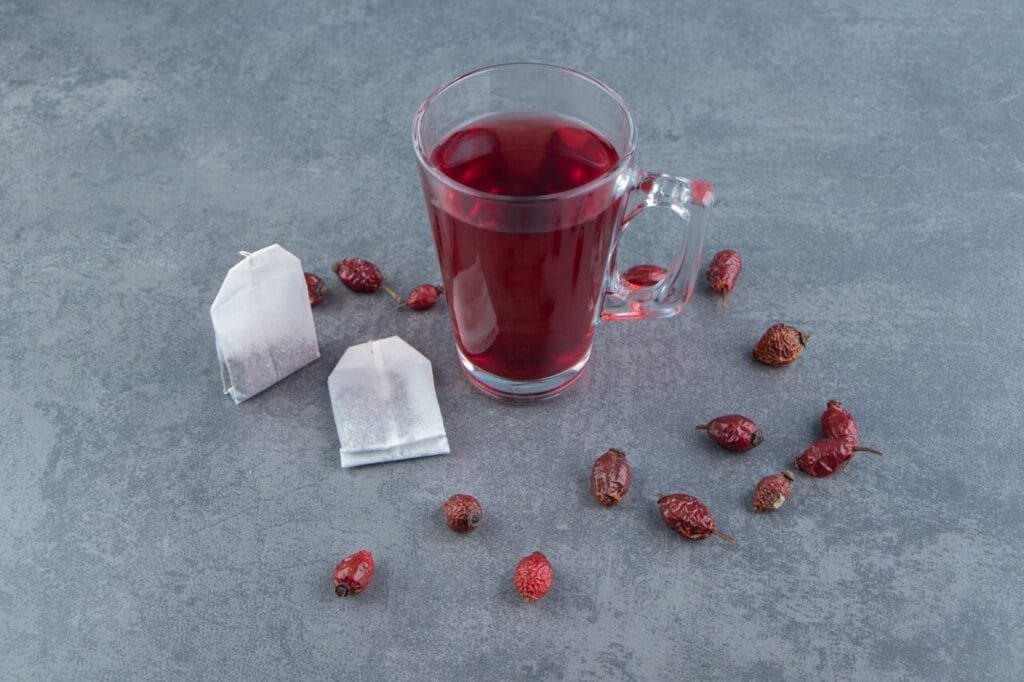Table of Contents
Rosehip tea has been praised for its numerous health benefits and its delicious, tangy flavor. But exactly what is rosehip tea good for, and how can you incorporate it into your wellness routine? From boosting your immune system to promoting glowing skin, rosehip tea is a versatile herbal remedy. However, it’s essential to be aware of potential side effects and know how to make rosehip tea the right way to reap its full benefits.
In this article, we will explore in detail what is rosehip tea good for, the potential rosehip tea side effects, and how do you make rosehip tea at home. By the end, you’ll have a comprehensive understanding of why rosehip tea should be a part of your healthy lifestyle.
What Is Rosehip Tea Good For?
Rosehip tea is derived from the small, red fruit of the wild rose plant, particularly Rosa canina. Packed with vitamins, antioxidants, and anti-inflammatory compounds, rosehip tea has been used for centuries in traditional medicine. Here are some of the top benefits you can enjoy by incorporating rosehip tea into your daily regimen.
1. Boosts Immune System Function
One of the most well-known advantages of rosehip tea is its high vitamin C content. In fact, rosehips contain more vitamin C than most citrus fruits! Vitamin C plays a crucial role in boosting the immune system, helping your body fight off infections, colds, and flu. If you’re feeling under the weather or looking to prevent seasonal illnesses, drinking rosehip tea might provide the immune support you need.
2. Improves Skin Health
If you’re struggling with skin issues, rosehip tea could be your secret weapon. Its antioxidants, particularly vitamins C and E, help protect the skin from damage caused by free radicals, such as pollution and UV rays. Moreover, rosehip tea may help boost collagen production, improving skin elasticity and reducing the appearance of fine lines and wrinkles.
Additionally, the tea’s anti-inflammatory properties can help reduce redness and irritation, making it a great choice for people with sensitive skin or conditions like eczema.
3. Supports Heart Health
Rosehip tea is also good for your cardiovascular system. Its rich antioxidant profile, particularly flavonoids, helps to lower oxidative stress and reduce inflammation, which are critical factors in heart disease. Studies have shown that rosehip tea may assist in reducing cholesterol levels, lowering blood pressure, and improving overall heart function.
By drinking rosehip tea regularly, you can support your heart health naturally, without relying on harsh medications.
4. Relieves Joint Pain
For those suffering from joint pain, especially due to arthritis, rosehip tea can provide natural relief. The anti-inflammatory compounds in rosehips can help reduce pain and stiffness in joints, making it easier to move around and maintain an active lifestyle. Some studies suggest that drinking rosehip tea can significantly reduce symptoms of osteoarthritis and rheumatoid arthritis over time.
5. Promotes Digestive Health
Rosehip tea is excellent for maintaining a healthy digestive system. It contains pectin, a natural fiber that supports gut health by promoting regular bowel movements and reducing constipation. Additionally, the tea has mild diuretic properties, which can help cleanse the body by promoting healthy urination and flushing toxins from the kidneys.
6. Aids in Weight Loss
Looking for a natural way to support your weight loss goals? Rosehip tea may help! Its ability to reduce inflammation and improve digestion can aid in weight management. Additionally, the tea is low in calories and provides a naturally sweet flavor, making it a healthy alternative to sugary drinks. Some research suggests that the polyphenols in rosehips may inhibit the absorption of fats, making rosehip tea a great choice for those looking to shed some pounds.
7. May Help Prevent Chronic Diseases
Due to its rich antioxidant content, rosehip tea may play a role in preventing chronic diseases like cancer and diabetes. The antioxidants in rosehip tea help neutralize free radicals, which are unstable molecules that can cause cellular damage and lead to various chronic conditions. Regular consumption of rosehip tea may help lower your risk of these diseases while promoting overall health and wellness.
👉 Boost Your Glow – Sip Premium Rosehip Tea Today! 👈
Rosehip Tea Side Effects

While rosehip tea offers an impressive list of health benefits, it’s important to be aware of potential side effects, especially if you drink it in excess or have underlying health conditions.
1. Allergic Reactions
Some people may experience allergic reactions to rosehip tea, especially those who are sensitive to plants in the Rosaceae family, such as roses, apples, or almonds. If you notice symptoms like itching, hives, or swelling after drinking the tea, discontinue use and consult your healthcare provider.
2. Digestive Issues
While rosehip tea can improve digestion for many, some people may experience mild digestive issues such as stomach cramps, diarrhea, or nausea when drinking it for the first time. These symptoms typically subside as your body adjusts, but it’s always a good idea to start with a small amount and see how your body reacts.
3. Kidney Stones
Rosehip tea is rich in vitamin C, which is generally good for you. However, consuming too much vitamin C can lead to the development of kidney stones in susceptible individuals. If you have a history of kidney stones or are at risk for developing them, it’s essential to monitor your vitamin C intake, including from rosehip tea.
4. Interaction with Medications
Rosehip tea may interfere with certain medications, including blood thinners, diuretics, and medications for diabetes. If you’re taking any prescription medications, it’s best to consult with your doctor before incorporating rosehip tea into your diet.
👉 Vitamin-Packed & Naturally Sweet – Try Rosehip Tea! 👈
How Do You Make Rosehip Tea?

Making rosehip tea is a simple and enjoyable process that can be done with fresh or dried rosehips. Here’s how you can brew your own cup at home.
Ingredients:
- 1-2 tablespoons of dried or fresh rosehips
- 2 cups of water
- Honey or lemon (optional)
Instructions:
- Prepare the Rosehips: If you’re using fresh rosehips, rinse them thoroughly to remove any dirt or debris. You can also cut them in half to release more flavor. For dried rosehips, no preparation is needed other than measuring them out.
- Boil the Water: Bring 2 cups of water to a rolling boil.
- Steep the Rosehips: Add the rosehips to the boiling water, then reduce the heat and let them simmer for about 10-15 minutes. This allows the nutrients to infuse into the water.
- Strain and Serve: After simmering, strain the tea into a cup using a fine mesh sieve to remove the rosehips. If desired, you can add honey or lemon to enhance the flavor.
- Enjoy!: Your rosehip tea is ready to drink. Enjoy it warm or chilled, depending on your preference.
Rosehip tea can be stored in the refrigerator for up to a week, making it a convenient option for busy individuals.
Conclusion
In summary, what is rosehip tea good for? The benefits range from improving skin health to supporting heart function and even aiding in weight loss. While it’s a fantastic herbal remedy, be mindful of potential rosehip tea side effects, especially if you have underlying health conditions. And now that you know how to make rosehip tea, you can enjoy this delicious and nutritious drink at home. Whether you’re sipping it for its health benefits or simply enjoying its refreshing taste, rosehip tea is a versatile addition to your daily routine.













